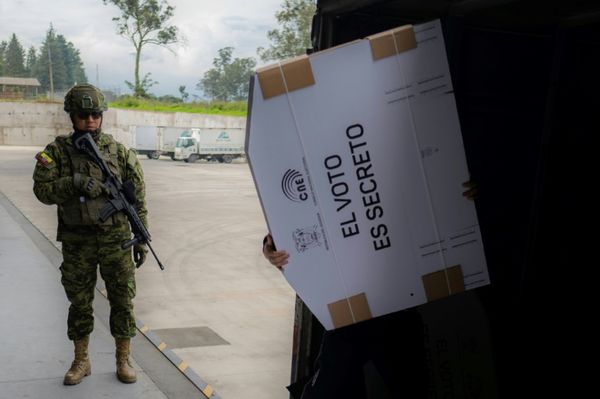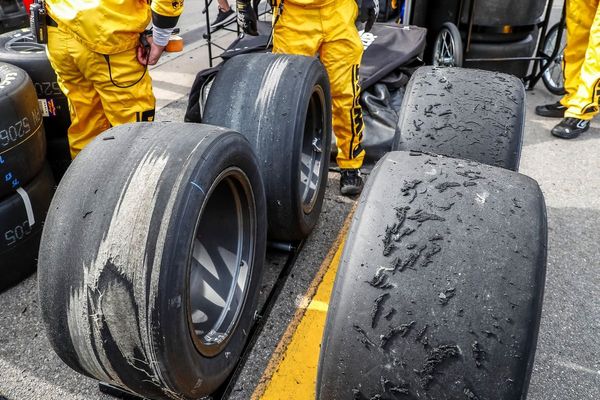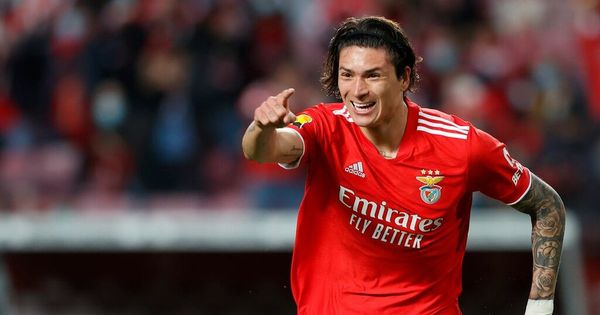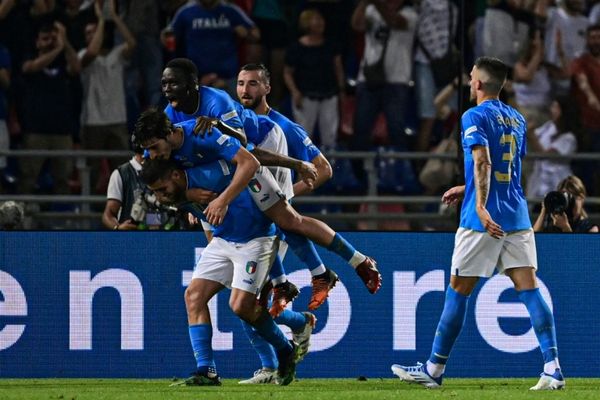
Serie A lost some stars, but the football on the pitch still sparkled. Without Cristiano Ronaldo, Romelu Lukaku, Achraf Hakimi, Gianluigi Donnarumma or Antonio Conte the league simply had to make do with one of its most compelling title races for decades.
It ended as a duel between Milan and Inter, two halves of the same city, clubs who share a stadium and the black stripes on their shirt but are divided by the red and the blue. Rivals who have emerged together from a decade in the wilderness, reminding themselves and each other that this league did not always belong to that lot down the road in Turin.
After ending Juventus’s run of nine consecutive league titles last season, Inter had hoped to launch their own era, chasing the 20th Scudetto that would earn them a second star above their club crest. Instead, it was Milan who claimed No 19, pulling back level, restoring balance to the Force. The symmetry between these clubs is remarkable. Each has finished as runner-up 16 times as well.
Both teams had their moments. Simone Inzaghi was dealt a rough hand in his first few weeks at Inter, having accepted the job in the knowledge that Hakimi would depart but with an expectation that Lukaku should stay. Despite those circumstances, his team’s best football had a fluidity and ambition exceeding that of his predecessor. His players spoke endlessly of newfound “freedom”.
Yet Inter were also brittle. They won the Coppa Italia and Supercoppa as well as reaching the Champions League knockouts – objectives this club had not achieved in more than a decade. But they threw away their title bid: blowing a lead against Milan in the season’s second derby and most infamously losing at home to Bologna after a calamitous error by backup goalkeeper Ionut Radu.

Milan had their own missteps – losing at home to Spezia and Sassuolo – but learned consistency when they needed it most, ending on a 16-game unbeaten run. Their manager, Stefano Pioli, insisted loudly and often that his team were not title contenders. Only at the end did he admit he and the club’s directors had always talked about it in private, that his protests were simply a bluff.
He had not wanted to place undue pressure on a young squad, though his players sought it out for themselves. Sandro Tonali, the 22-year-old midfielder who negotiated his own wages down so he could stay at the club last summer, told reporters in November about his plans for a title-winning tattoo. This spring, he scored a 91st-minute winner away to Lazio and a pair of goals against Verona to keep those plans on track.
Experienced heads played their part. Zlatan Ibrahimovic scored eight goals by early January and if he slowed down it might be because he was apparently playing without a cruciate ligament in his left knee. Olivier Giroud broke the curse of Milan’s No 9 shirt, becoming the first player to hit double figures while wearing it since Pippo Inzaghi, but more than that he struck at crucial times: against Inter, Napoli, Lazio and early to ease nerves on the final weekend.

But it was the youthfulness of the rest of this Milan team that made their charge through the second half of the season so thrilling, the sense of a team growing up together, taking the step, as Pioli outlined in January, from “young footballers” to just “footballers”.
Nobody embodied that evolution better than Fikayo Tomori, who arrived in Milan last January with his career at a crossroads but who has grown into one of Serie A’s most commanding centre-backs. His talent was already noted, but his leadership emerged in the second half of this campaign, when Simon Kjær was injured and the Englishman found himself playing the senior defensive partner to Pierre Kalulu, an adapted full-back.
Where fragility might have been expected, Milan only grew more secure – racking up 12 clean sheets in the second half of the campaign. It helped, of course, that Donnarumma’s successor Mike Maignan turned out to be brilliant as well.
Yet to focus only on Milan – the club or the city – would be to miss what made this season so thrilling. For the longest time it was a three-horse race for the Scudetto. Napoli matched their best-ever start to a Serie A season, winning eight games straight. After 11 matches, they had 31 points and only three goals conceded. How different might their season have been without the cheekbone fracture suffered by Victor Osimhen against Inter in November? That match would end in their first defeat. Over the next month, they suffered another three.
There would be chances to recover. Napoli had an opportunity to go top in February when they outplayed Inter but were held to a 1-1 draw. That was less galling than their two games with Empoli, who beat them in Naples, didn’t win another game for four months, then came from 2-0 down to beat them a second time in Tuscany.
None of the contenders were perfect. From 10 January until the end of April there was not a single weekend when all of the top three won. Still, they were all miles ahead of Juventus, serial winners for almost a decade, who finished 16 points behind in fourth.
Better things were expected from Massimiliano Allegri when he returned as manager of the Bianconeri last summer, yet even to finish this high might have felt like a relief for a side who failed to win any of their first four games and remained seventh after 14. Confident predictions that Juventus could be better off without Ronaldo proved wide of the mark.
All of Serie A’s departing stars took something with them. In terms of pure technical quality, the bar at the top of Serie A has been lowered. But here’s the dirty truth about football: it doesn’t need to be flawless to be fun. Just ask the 100,000 Roma supporters who flooded the Circus Maximus to celebrate a Europa Conference League triumph four years after playing in a Champions League semi-final.

José Mourinho’s first season with the Giallorossi was eventful from the start – unleashing Tammy Abraham before the player had even been able to train with his new teammates and reaping the rewards as the Englishman piled up 21 goals in all competitions. The manager had plenty of missteps but in the end it is the trophy he won that will be remembered. That, and perhaps the image of a Special Run after winning his 1,000th game.
Lazio placed higher between the Rome clubs, landing in fifth despite never quite taking flight as fans had hoped after Maurizio Sarri won the derby and posed with an eagle. Fiorentina’s push to seventh place, claiming next season’s Europa Conference League berth despite selling Dusan Vlahovic in January, won deserved acclaim for manager Vincenzo Italiano.
This season was a thrilling, chaotic ride from top to bottom. If the title race felt unpredictable then what are we to say of a relegation battle that also went down to the final day? Salernitana looked dead and buried when Davide Nicola took over as manager – bottom of the table with three wins from 23 games. They had almost been kicked out of the league in December but wound up finishing a point ahead of Cagliari in 17th.
Or maybe that was the most foreseeable part of it. After all, Nicola has produced miracles like this one before. More rare was the sight of Domenico Criscito missing a penalty. The captain’s tears after fluffing his lines in the Derby della Lanterna, after halting a move to Toronto to try to save the club he loves, were heartbreaking to most but ambrosia to fans of Sampdoria who have felt the shoe on the other foot before.
There were countless more personal dramas along the way – far more than I can possibly recount here. So without further ado, let’s get on with some end-of-season awards.
Goal of the season
7) This one might just be my personal vice, but Gianluca Caprari’s spinning backheel volley makes me smile.

6) I have no idea how Antonio Candreva makes this look so casual.
CANDREVA!! WHAT A HIT!!! 😤
— Football on BT Sport (@btsportfootball) October 3, 2021
One touch, look up, and blast it 💥
What a goal 🥵 pic.twitter.com/MqbFXE4rsO
5) Davide Faraoni with a self-serve volley off the bar for Verona against Roma.
OH MY WORD!! 🤯
— Football on BT Sport (@btsportfootball) September 19, 2021
Davide Faraoni scores an absolutely obscene volley to put Verona 3-2 up against Mourinho’s Roma. 😅 pic.twitter.com/hDrMu5jTSw
4) It wasn’t as good as George Weah’s, but Theo Hernández’s coast-to-coast against Atalanta deserves extra points for being scored in a must-win game at the end of a season with a Scudetto on the line.
This Theo Hernández fella is unreal! 😱
— Football on BT Sport (@btsportfootball) May 15, 2022
Runs through the entire Atalanta squad and slots home Milan's second.
Is that the goal that seals the title? 🏆 pic.twitter.com/z6MsbhrSsO
3) Free-kick perfection from Lorenzo Pellegrini (in the derby no less).
Roma are on FIRE 🔥
— Football on BT Sport (@btsportfootball) March 20, 2022
Lorenzo Pellegrini unleashes a beautiful shot to make it 3-0 🚀
No stopping that! pic.twitter.com/Zk9lkOExgK
2) Thanks for coming Domenico Berardi, Federico Bonazzoli and João Pedro, but this year’s Best Overhead Kick subcategory belongs to Keita Baldé.
Oh yes Keita Baldé! What a goal 😍
— Football on BT Sport (@btsportfootball) November 21, 2021
The Senegalese international with a marvellous overhead kick for Cagliari! pic.twitter.com/0HSwRiVgV0
1) Listen, Fabián Ruiz and Pedro both scored outrageous goals in the same game between Lazio and Napoli at the end of February and they’re played back-to-back in this YouTube highlight so I’m refusing to choose between them and just giving you both instead.
Best goal from a corner
JUAN CUADRADO SCORES DIRECTLY FROM A CORNER! 😳
— Football on BT Sport (@btsportfootball) December 5, 2021
What. A. Goal! 💫 pic.twitter.com/BwWIR3gKdT
Best unintended assist
I’m fairly convinced Álvaro Morata was trying to score here, but his overhead kick against Bologna wound up being the sweetest of assists for Vlahovic instead.
Player of the season
I really struggled with this one. The Lega Serie A’s own award for Most Valuable Player went to Rafael Leão and I certainly could get on board with that – he’s had a sensational season, his 11 goals and eight assists understating the impact of his pace and direct running to Milan’s title bid. But the Rossoneri’s success has always been about the collective for me: a group in which different players have produced at different times – from Maignan and Tomori at the back through to Tonali’s emergence in midfield and Giroud’s crucial goals up front. That’s not to mention Hernández, whose attacking contributions from full-back have obliged opponents to adapt their whole approach around him, and many more besides.
I think you could make a case that Bremer, for instance, made more of an individual impact for Torino, as a player who stood apart, shutting down some of the league’s most prolific centre-forwards on a weekly basis – the one true soloist, if you will in Ivan Juric’s footballing Death Metal band. So I’m going to give my award to him. But, look, Leão would be a great choice too and you’re all welcome to yell at me in the comments for being contrary.
Team of the season (4-3-3)
Mike Maignan; Giovanni Di Lorenzo, Bremer, Fikayo Tomori, Theo Hernández; Sandro Tonali, Lorenzo Pellegrini, Marcelo Brozovic; Domenico Berardi, Ciro Immobile, Rafael Leão.
Manager of the season
If Milan’s triumph belonged to the collective, then ultimately that comes back to the manager. Pioli deserves all the praise in the world for nurturing his squad, helping individuals to get better and the team to grow together, as well as finally winning the piece of silverware that his mum has been nagging him about for 20 years.
But I also want to give a big honourable mention to Vincenzo Italiano, who added 22 points on to Fiorentina’s points total from last season despite losing his star striker in the middle of the campaign. It was his leadership that made sure the Viola will be back in Europe next season for the first time in five years.
Biggest surprise
Juan Musso thought he was winning this prize when he returned from international duty to find that his partner Anna Ariaudo had filled the room with heart-shaped balloons. But the award goes to everyone who saw the original Instagram post that he shared to commemorate her efforts, for which he ought to have given a little thought to the placement of the mirror on the opposite side of the room, and the fact that he was not wearing any clothes …
Saddest injury
Federico DiMarco, picking up a knock in a warm-up for a game that was not even taking place. Inter had already been informed that Bologna would not be showing up – having been ordered to stay home by the local health authority due to a Covid outbreak.
Best fan choreography
Before the first Derby della Madonnina in November, Milan supporters in San Siro’s Curva Sud expressed thanks to Italy’s medical workers for their work through the coronavirus pandemic with a scenografia in three parts. First came a series of smaller banners that read: “To those who fought, to those who did not make it, to those who fought on the front line to save the nation, we give honour to all these people, dedicating them the most important choreography of the season.” Next came the word “Grazie” – thank you – spelled out across a whole tier in placards designed to look like the line on an ECG. Finally, a gigantic image of three medical professionals with the Italian flag, beneath the message “Milan does not forget”.
Most prolific
Oh, sure, Ciro Immobile’s 27 goals are a lot, but this prize goes to Napoli’s shirt designers, who came up with an astonishing 15 different designs to flog to fans this season.
Game of the season
Juventus’s 4-3 win over Roma in January had everything: a red card, a penalty, a three-goal comeback, crucial VAR interventions and multiple opportunities to cut between Lorenzo Pellegrini making magic on the pitch and Francesco Totti approving in the stands to symbolise a baton being passed. Most unlikely of all, it even had a match-winning goal from Mattia De Sciglio. Too much happened to even try to recount here (it was a struggle enough in a 1,200-word column) but the most instructive verdict might have been the one offered by Marco Landucci – filling in for the suspended Massimiliano Allegri. “I hope he comes back soon,” said the deputy, “because I just lost five or six years of my life.”

Best shoes
The €800 Balenciagas that Mourinho promised to Felix Afena-Gyan as a reward if he could deliver Roma a win away to Genoa. The 18-year-old academy graduate entered the game at 0-0 in the 74th minute and scored twice, his second an absolute belter from outside the box. He got his shoes the next day.
Best use of a shoe
Davide Nicola, who ripped one off in a fit of frustration during his team’s win over Fiorentina in April, threw it on the floor and then went to retrieve it before clutching it in his hand and using it to menace his players like a grumpy adult dealing with pesky kids in a 1980s cartoon.
Scenes during Salernitana’s huge win over Fiorentina.
— Sacha Pisani (@Sachk0) April 24, 2022
Manager Davide Nicola took off his shoe in a fit of rage directed at one of his players 😅😂
Worked out well as Salernitana went on to win & boost their Serie A survival hopes.#SalernitanaFiorentina pic.twitter.com/8skBh8hyaG
Best teachers
After watching their dad miss three penalties in the first two months of the season, eight-year-old Carmine Insigne and his six-year-old brother Christian knew it was time to take matters into their own hands. During the car journey back from Napoli’s win over Torino, the scene of the third miss, they warned their father, Lorenzo, that they would be getting the ball out as soon as they got home to show him how to strike a spot-kick properly. He converted eight of nine thereafter.
Most devoted
The 16 Salernitana fans who made a 1,000-mile round trip away to Udinese in December despite knowing no game would take place. Their team had been barred from travelling by local health authorities back home after a Covid outbreak. Salernitana were bottom with eight points from 18 games, but fans did not know when they would next have a chance to cheer them on anywhere. The club had 10 days to find new buyers or be thrown out of the league due to the conflict of interest that had been created when they were promoted while co-owned by Claudio Lotito – the president of Lazio.
This was a mess 10 years in the making, with the Italian Football Federation complicit for allowing Salernitana special exemptions to get to this point, but the club would be rescued at, quite literally, the 11th hour. The businessman Danilo Iervolino had his takeover offer accepted by trustees at 11.58pm on the 31 December.
Best food choices
Tomori, tentatively trying his first sfogliatelle on a flight home from Naples.
Worst food choices
Inter’s Alessandro Bastoni, discussing the secrets of Ivan Perisic’s longevity at the end of a game this May. “Three nights ago he was out there sprinting in the 117th minute. Then tonight it’s like [instead of being tired] he’s even better than before … I asked him to tell me what he eats because I want to go as hard as he does. I learned that he eats bread, avocado and turkey, incredible! So I decided to leave that conversation alone from now on.”










